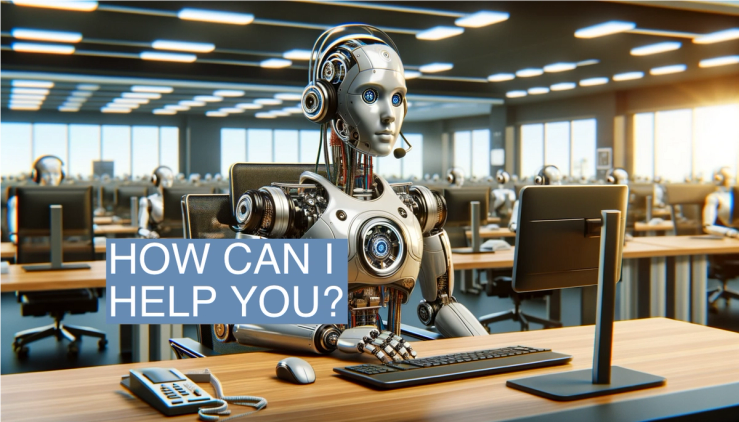The Scene
Dennis Woodside is one of those brand name operators in Silicon Valley, after working as an executive at Google, Dropbox, and Impossible Foods.
While those are familiar brands, you might not have heard of Freshworks, where Woodside is president. But the fast-growing company touches a lot of consumers by building the back-end software that helps companies provide customer support. And that is a very interesting area right now, as AI seems poised to automate much of that ecosystem.
We talked about this and more in this edited interview.
The View From Dennis Woodside
Reed: Everyone was using some form of AI before ChatGPT, but the leap in capabilities seemed to surprise many people. Did that change Freshworks’ strategy at all?
Dennis: It totally changed our strategy. We just did our investor day and we showed demos across the three product sets: Customer support, IT, and sales and marketing. Every one featured AI. Girish [Mathrubootham] saw the opportunity for AI to allow the [human] agents to focus on higher value activity and have the AI automate the rote activity. The AI is good enough to converse in a very natural way with the customer or with the employee about what’s the problem. How can I help? I need the following information in order to solve the problem. It’s very intuitive now. And the large language models have enabled that.
Q: Do AI customer service bots risk creating an embarrassing incident?
A: We think of AI as helping in three ways. It helps self service. The second is acting as a co-pilot for the agent and making the agent more productive. For example, it’s pretty common if you’re a customer support agent to have to summarize an interaction that may have gone across a couple of days and a couple different exchanges. AI can summarize that at the push of a button into a short paragraph that anybody can digest.
And then there are insights. So if I am managing a customer support team of 100, the AI can surface insights that would be very hard to find. The AI can say, ‘Good morning, Dennis. Wanted to make sure you are aware that there’s a spike in dissatisfied customers over the last couple of days. Do you want to learn more?’
The risk of an AI failure, if you’re surfacing something to a customer support agent, is not that high. Over time, the bots are going to comply with norms of response and language, and the guardrails are going to be more developed.
Q: Has there been an evolution with your customers over the past year?
A: I’d say it’s more of a revolution. Every company was aware of AI a year ago. Now every customer support leader or IT leader, sales and marketing leader are aware. They have to have a strategy for how they’re going to deploy AI. Their customers are expecting it. They are all under pressure to spend less on support operations.The software is a fraction of the labor costs.
So they’re looking at either not growing their labor cost or cutting it entirely and using software to solve the problems humans were previously solving.
Q: Are there any customers who say ‘I don’t think this stuff is ready. I’m not going to use it’?
A: We have customers in businesses that are very personality driven with very high net-worth customers. They don’t feel ready to hand off that interaction to a bot. One of our customers services some of the largest hedge funds in the world. When that customer calls, that might be a $1 million account. They don’t currently want to hand that off to a bot. So you do get some of that. But every consumer business has to be deploying AI. They just can’t afford not to not to do that.
Q: You hear people like Sam Altman talk about how this is getting so good that it’s going to just find a way to make money for them. If that’s true, doesn’t it ultimately threaten Freshworks?
A: No. AI will enable our customers to create better business outcomes for their customers, improve the productivity of the agents and reduce the need for agents entirely. The value of that across all three dimensions is huge. They will be willing to pay for software that does that. For the agents that do exist, it’s a per seat license fee.
For where we’re taking agent cost out, we monetize the interaction with the consumer. So we sell what are called ‘bot sessions.’ A human interaction could be $50. So if we can price our bots at a fraction of the $50, they’re going to be willing to pay for that.
Q: You’ve had more experience than most people in tech across different categories. What excites you right now?
A: The leveling effect that any new technology has. And whenever you have the introduction of something that’s truly different, and disruptive, it gives rise to a whole new set of businesses.
I joined Google in 2003 and digital advertising was relatively new. Businesses figured out digital advertising first. And they figured out how to scale globally. If I wanted to build my business in the past, I had to have a marketing presence and have a PR agency in every country in the world. If I want to build a truly global business, now I can just go on AdWords and buy an ad campaign in Turkish and Polish and Russian and all of a sudden, I’m competing in that business.
AI has the same kind of effect. AI allows a small business to create an experience that is as good or better than a large business. You’re going to see some smaller companies that aren’t technology companies, that grow very, very fast because they leaned into AI faster than their risk-averse, large competitors.
Q: Are there any sectors that will benefit more?
A: The most traction we’re seeing is more on the consumer side. We have a lot of travel companies. And travel is an area that’s very complex. The rules around fare changes and flights, etc. So the customer service interaction is expensive and prone to automation, prone to AI.
Two of the four largest U.S. steel manufacturers are customers of ours. Their employees are demanding much more modern experiences. They’re more remote. They’re not necessarily wanting to communicate through phone or email. They’re using chat and other means to get their IT needs satisfied.
Q: I’m sure you still talk to people at Google. Do you think AI is a threat to search?
A: I had a customer email me the other day looking for a new IT service product. In the past, they would Google it. Now they just went to ChatGPT. They said we have 500 employees. We need something that’s flexible, fast, does the following 10 things, and has the following security requirements. What do you recommend? ChatGPT ranked the order, spat out what it recommended and why. We were at the top of the list.
More people are starting to use ChatGPT to solve information problems. And that’s a threat to Google. A single blue link is very different than what ChatGPT provided in that example. As more customers go to ChatGPT as their starting point, there’s a business to be built around how do you ensure your product is at the top of the answer list just like SEO came out of search.
Q: Did you study that to figure out why you came out on top?
A: It’s very hard to figure that out. If you think back to the early days of Google, it wasn’t that transparent how Google surfaced information. SEO sort of reverse engineered it. And then a set of practices evolved. Eventually, Google figured out it needed to give some guidance to the SEO world because SEO practices were kind of spammy. Maybe that’s what happens with ChatGPT.
Q: Have you done anything to try and optimize the language on your website to make sure it’s picked up?
A: Yeah, all that matters. It’s a lot of the same principles. It’s searchable, it’s readable, it’s well organized. I would not be surprised if there are businesses being built just on ChatGPT prompts and figuring out how to be the top thing that ranks there.
Q: From your years at Impossible Foods, I’m sure you pay attention to more scientific tech. Do you follow AI’s impact there?
A: There are a lot of areas where you’re going to see more AI complement products. Health is really interesting. You’re a cyclist, so things like ‘how does my blood glucose level affect my performance?’ In the past, it was hard to know your blood glucose level on a constant basis and there was no software that would help you figure out what it was telling you. I signed up for an app called January that monitors glucose with a pad. I wore the pads for a week.
They are using AI to give me insights into how what I eat affects my performance, and the timing of when I eat, and, and how to modify that to perform better or feel better when I’m racing.

Q: What did you do differently as a result?
A: I had been eating 200 calories an hour as my standard for a long workout. And the AI and the blood glucose indicated that was nowhere near enough. My blood sugar was spiking and then crashing. I got more fatigued as it crashed. And it could correlate that with my heart rate and my power output. The insight is I’ve got to eat more than I thought to keep an even sugar level on a long workout.
Q: Do you think LLMs could act as agents for you, where it’s not just giving you information about your trip, but booking the tickets and hotels.
A: That’s a world that we’re starting to think about. What if I have an agent who knows my preferences? And I’d say to my agent, which maybe it’s an app on my phone, ‘I need to fly to New York, on Tuesday, the 23rd. I don’t want to leave before 8am or after 10am. And I want a window seat. Pick my flight, please. I’m willing to pay $1,000 for business class.’ And it’ll figure it out. There’s no reason that can’t happen.
Q: What’s the limitation? Why haven’t we seen it yet?
A: Costs. They have to train on a corpus of information. And the way they’re doing it now, it’s relatively time limited. It’s not in real time. But if the machines were fast enough and they had enough data, they could do it in real time. It’s a little like Google in the early days. Google used to crawl like every third day. But it just was a matter of machine limitations and cost. Timeliness used to be a huge thing for Google. We called it freshness.
That’s just a question of freshness for ChatGPT. And that’ll get solved.
Q: How are you using AI and where do you start your searches?
A: I still start on Google because Google is ubiquitous and easy to get to. With ChatGPT, you have to sign in. It’s still a little bit of a pain. It’s slow sometimes. But if I have a more complex question. Here’s an example. I was looking at a new car and I was trying to figure out what a snow tire is. What qualifies as a snow tire and allows you to go on the roads without chains in California?
I threw that into Google. I couldn’t find the answer. So I went to ChatGPT. It helped me understand what qualifies as a snow tire and it explained very clearly. I’ve also asked it to give me cycling routes. You can say ‘I want to go 50 miles, only paved roads, low traffic. Where should I go?’


